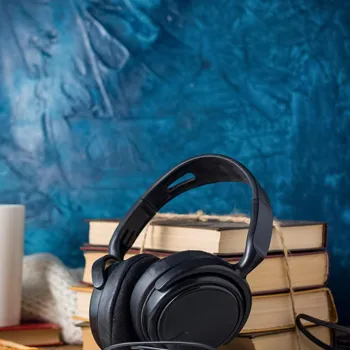Discover the profound impact of music on your well-being! Learn 7 surprising ways music boosts your health. Let the melody heal your mind, body, and soul
In the hustle-bustle of Indian life, finding moments
of peace can feel like a herculean task. But what if a simple remedy to stress and anxiety was already at your fingertips? Yes, we are talking about music! Music, the universal language, has a profound impact on our well-being.

It's not just about enjoying a catchy tune; it's about harnessing the power of sound to improve your mental, physical, and emotional health. Let's explore 7 fascinating facts that reveal how music can enhance your overall wellness.
Music Reduces Stress and Anxiety: Imagine coming home after a long day at work, the traffic snarls still echoing in your ears. Before you reach for that cup of chai, try putting on some calming music instead. Research shows that listening to slow-paced music, around 60-80 beats per minute, can significantly reduce stress hormones like cortisol. This can lead to a feeling of relaxation and calm, helping you unwind and prepare for a peaceful evening. Specific genres like classical, instrumental, and ambient music are particularly effective in soothing the mind. So, next time you're feeling overwhelmed, let the music wash away your worries and restore your inner peace. It helps release endorphins too.
For example, listening to raag Bhimpalasi may help you feel light.

Music Improves Sleep Quality
Are you tossing and turning at night, unable to switch off your racing thoughts? Music might be the answer to your sleep woes. Studies have found that listening to relaxing music before bed can improve sleep quality and duration.

The key is to choose music that is gentle, soothing, and doesn't have a strong beat or complex melodies. Instrumental pieces, nature sounds, or even soft Indian classical music can lull you into a restful slumber.
Avoid upbeat or energetic music, as it can have the opposite effect and keep you awake. Create a bedtime playlist of your favorite relaxing tunes and let the music guide you to a peaceful night's sleep.
It is also advisable to avoid any exposure to any music at least 30 minutes before going to sleep.
Music Boosts Your Mood
Feeling low or down? Put on some upbeat music and watch your mood lift! Music has a powerful ability to evoke emotions and trigger the release of dopamine, the "feel-good" neurotransmitter in the brain.
Listening to your favorite songs can instantly boost your spirits and make you feel happier and more energized. Dancing to music is even more effective, as it combines the joy of music with physical movement, further enhancing the release of endorphins.
So, whether you're feeling stressed, sad, or just need a pick-me-up, turn up the volume and let the music fill your heart with joy. Listening your favorite genres in music can instantly create a positive impact on your mood. Music gives you a feeling of wellness.
Music Enhances Memory and Cognitive Function: Music is not just a treat for the ears; it's also a workout for the brain. Studies have shown that listening to music can improve memory, attention span, and cognitive function. Music stimulates different areas of the brain, strengthening neural connections and enhancing overall brain health. Learning to play a musical instrument is particularly beneficial, as it requires coordination, focus, and memory skills. Even simply listening to music can sharpen your mind and improve your cognitive abilities as you age. It’s like a brain massage!
Listening to music improves blood flow levels in specific parts of your brain.

Music Helps Manage Pain: Believe it or not, music can also be a powerful pain reliever. Research suggests that listening to music can distract you from pain and reduce the perception of discomfort. Music can also release endorphins, which have natural pain-relieving properties. Studies have shown that music therapy can be effective in managing chronic pain conditions, such as arthritis and fibromyalgia. Whether you're experiencing a headache, muscle ache, or chronic pain, try listening to your favorite music and see if it helps ease your discomfort.
Music can help reduce your need for painkillers.

Music Encourages Social Connection: Music is a shared experience that can bring people together. Whether you're attending a concert, singing in a choir, or simply listening to music with friends and family, music fosters social connection and belonging. Sharing your favorite songs and artists with others can create meaningful conversations and strengthen relationships. Music can also be a powerful tool for communication, allowing you to express your emotions and connect with others on a deeper level.
Create a playlist with family and friends and listen to the same music on your phone, laptop or television, this surely will encourage social connection.

Music Promotes Mindfulness: In today's fast-paced world, it's easy to get caught up in thoughts and worries. Music can help you practice mindfulness by bringing you back to the present moment. When you focus on the sounds, rhythms, and melodies of music, you can quiet your mind and let go of distractions. Listening to calming music can be a form of meditation, allowing you to relax, de-stress, and connect with your inner self. Incorporate music into your daily mindfulness practice and experience the benefits of being present in the moment.
Focusing on the rhythm and the beats can create an environment where you can improve your overall well being.

Music enhances well-being by reducing stress, improving sleep, boosting mood, and more
In conclusion, music is much more than just entertainment; it's a powerful tool for enhancing your overall well-being.
By incorporating music into your daily life, you can reduce stress, improve sleep, boost your mood, enhance memory, manage pain, encourage social connection, and promote mindfulness. So, go ahead, put on your favorite tunes and let the music heal your mind, body, and soul.
AI Generated Content. Glance/InMobi shall have no liability for the content















